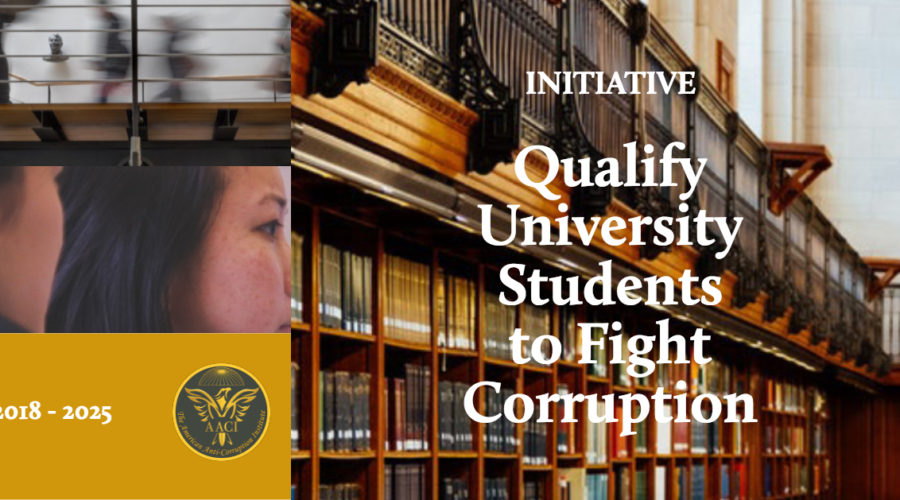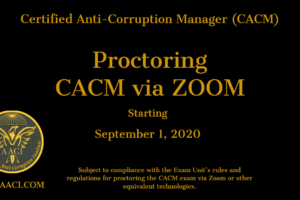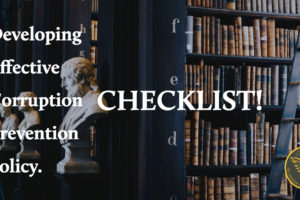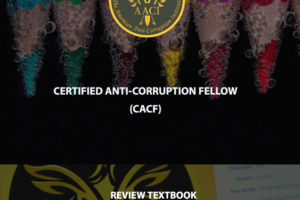THE INITIATIVE OF THE AMERICAN ANTI-CORRUPTION INSTITUTE (AACI) FOR UNIVERSITIES IN THE MIDDLE EAST AND AFRICA: PROFESSIONAL QUALIFICATION FOR STUDENTS TO PREVENT CORRUPTION.
Tempe, May 9, 2018
Updated on January 25 and February 3, 2019
INTRODUCTION
It is indisputable that corruption decays the socio-economic and political fabric of nations especially in developing countries, where judicial systems are impacted and dysfunctional. It exacerbates unemployment, increases poverty, leads to inequality, promotes favoritism, and results in inferior public services. Corruption thrives when accountability, the rule of law, and good governance do not prevail. It paves the way on all counts for countries to fail.
New, untainted generations can lead the way out of the corruption maze. Young leaders can promise a better future. They can be a pillar for effective national anti-corruption strategies if armed with appropriate knowledge suitable for the big fight of corruption. Therefore, academic institutions must play an exemplary role in engaging youth in the prevention of corruption. Their mentors and faculty should also be an active role model widening their way to Leadership. The Arab and African universities today, in collaboration with The AACI, can provide faculty and students with adequate anti-corruption knowledge, qualifying them to deter, prevent, and detect corruption. Such acquired knowledge shall impact the cultural environment significantly, curbing corruption tendencies, and supporting corruption prevention efforts.
Based on our visits to many Arab and African universities and the information we gathered from multiple sources, we found that most Arab and African universities do not offer a required anti-corruption course or a stand-alone course on internal control, or principles of governance. Most of these universities that teach accounting and auditing could consider updating their methods to provide their students with an opportunity to emphasize Transparency, Accountability, Respect, and Compliance with the Rule of Law, Practicing with Professional Ethics, and Good Governance. We at The AACI firmly believe that these participating universities have a great chance to raise the bar and influence the national state in their countries to adopt and implement a National Strategy to Combat Corruption, Money-Laundering, and Terrorism Funding. We assert that these students will be able to carry the name of their universities when displaying their skills and their enlightened knowledge about the fight against corruption exemplifying patriotism and protecting the future of their countries and generations to come.
OUR INITIATIVE
The American Anti-Corruption Institute (AACI) is eager to collaborate with universities throughout the Middle East and Africa to share the knowledge that denies corruption access to the youth of the region, aiming to spread anti-corruption culture and promote values for sustainable socio-economic development and growth.
To meet such objectives, The AACI prepared the required material in a book (CACM Review Textbook) [note] On December 1, 2019, The AACI modified the initiative whereby the Certified Anti-Corruption Felloe (CACF) became available to students who completed 90 semester credit hours while the CACM is the professional qualification to the faculty [/note] that is available as self-study on its website for each student to enjoy the e-learning experience and attain a level that facilitates taking the Exam of the Certification for Certified Anti-Corruption Manager (“CACM”). Such a professional management credential enhances the competence and accentuates the leadership skills of successful students, and emphasizes the national role of higher education in building healthier nations and sustainable development.
The language of the CACM exam is English. Currently, the CACM Review Textbook is also in English. The CACM exam fee for students under this initiative is subsidized by The AACI and is therefore discounted to USD 300. Besides, The AACI pledges to offer up to 20 exams free for students who are unable to pay the exam fee, for each 100 paying students.
In conducting the Exam, The AACI takes all the necessary measures to protect the credibility of the professional certificate including impersonation fraud. Therefore, certain conditions apply to the supervision of the Exam which can be arranged to be supervised by The AACI or by the university or by a qualified professional third party who is experienced in conducting such a serious exam.
“CERTIFIED ANTI-CORRUPTION MANAGER” (CACM)[note] The CACF review course is two days while the CACM review course is 5 days [/note]: INTENSIVE REVIEW COURSE PREPARING STUDENTS TO SIT FOR THE CACM EXAM.
For those faculty and students who would like to prepare for the CACM exam, outside the self-study program, The AACI prepared a short three to five days condensed training course. A rigorous study of the material which is made available by The AACI may facilitate the success of the person sitting for the Certified Anti-Corruption Manager (CACM) exam. The AACI intensive training course is conducted in several countries as specified on The AACI website. Related fees, venue, and dates will be announced periodically for early registration as places per training session are limited. The CACM is considered the premier global professional management qualification that prepares decision makers for preventing and deterring corruption.
THE AMERICAN ANTI-CORRUPTION INSTITUTE (AACI)
The American Anti-Corruption Institute (AACI) is the only Institute that target professionals, executive management, and those charged with governance of any organization, be it commercial, professional association, not for profit or non-governmental to equip its decision makers with the required knowledge and skills enabling them to play a proactive role in preventing fraud and corruption. It achieves this objective through two premier certification programs. First, the Certified Anti-Corruption Manager (CACM) management credential. Second, the Organization Anti-Corruption Certification Program; an effective institutional change tool as
The AACI supports its certification programs with a series of learning programs accompanied by post-program online tests. In addition to public and in-house learning programs, The AACI offers its expert-led traditional training programs in two different settings: Mass Traditional Training (MTT) and Mass E-training.
The AACI is a private Institute that does not follow the U.S. government or any of its agencies directly or indirectly. Preserving and maintaining its integrity, objectivity, and independence, The AACI does not accept donations or financial support from an individual or entity. The Institute operates from its headquarters in Tempe, Arizona under the relevant United States regulations. Whenever the Institute provides services outside the United States of America, it abides by the U.S. regulations and the laws and sovereignty of the foreign States.
The fight against corruption, according to the scientific definition in this context, encompasses all efforts in prevention, deterrence, detection, and investigation. But we at The AACI believe that prevention is always better than cure. We, therefore, design and implement our specific and related learning programs to enhance the knowledge and professional skills of decision makers to upgrade their financial intelligence, and improve the quality of decisions to prevent and detect corruption in its early stages. Based on the above, we at The AACI empower decision makers to avoid corruption by equipping them with basic principles and skills in internal control, governance, fraud and corruption, money-laundering, financial statements fraud, effective decisions, and corruption prevention policy.
Our philosophy and vision for the prevention of corruption are based on several principles and beliefs. We believe that the fight against corruption is a scientific and methodological process based on many factors, the most important of which is that the lack of proper anti-corruption knowledge and skills is willful blindness. Therefore, qualified human resources are essential requirements to fight corruption at the national and institutional levels. Though the political will is required in the fight against corruption, the mere political will is not enough. We also believe that the effectiveness of the political will is eroded whenever the ordinary citizen is not touched by the common vengeance of the State’s efforts to combat corruption. We also believe that the entity’s leadership sets the proper tone at the top. Whether it is a country, ministry, or a company, its leadership shall embed in its socioeconomic fabric the concepts and principles of the rule of law, anti-corruption, accountability and responsibility, governance, internal control, equal opportunities, combating all aspects of nepotism, and combating conflicts of interest. It is what we call “institutionalization” of the fight against corruption. We want to reiterate the utmost importance of professionalism and integrity of the judicial branch of government which plays a crucial role to combat corruption.
One of our most important beliefs at The American Anti-Corruption Institute (AACI) is the promotion of youth and their role in the design, implementation, and evaluation of the national anti-corruption strategy. We proceed from the belief that young people are the leaders of the future and will be decision makers in their respective positions. The further the young people are equipped with the necessary knowledge to fight against corruption, the higher their understanding and awareness of the enormous national challenges and the catastrophic risks resulting from corruption and its evil. Such proper knowledge and awareness enhance the patriotism of young people and their affiliation to work with the national State in the implementation of the national anti-corruption strategy. We believe that the role of youth in the fight against corruption is fundamental and pivotal in the determination of the success or failure of the national anti-corruption strategy. The more the young people (university students) are engaged in the anti-corruption activities, the lower the risks of being radicalized and dragged behind misconceptions. We at The AACI have achievements in involving students in the fight against corruption.
To achieve The AACI’s objectives in the prevention of corruption, the Institute provides the above-mentioned professional certifications. We reinforce them by the provision of learning programs specialized in relevant knowledge fields specifically in anti-corruption and fraud, governance, internal control, effective decision and decision-making mechanisms, the role of executive management and those charged with governance, and auditing and accounting from a management perspective. The Institute is also collaborating with many universities around the world to integrate students into regular corruption prevention activities. Besides, The AACI focuses on field research, and participates and organizes international symposia and conferences. The AACI also provides advisory services in designing, overseeing the implementation, and evaluation of corruption prevention policies for the public and private sectors. In collaboration with the public and private sectors, The AACI usually launches innovative initiatives in awareness-raising and enhancing the culture of corruption prevention. Since 2013, the Institute has been operating in Saudi Arabia, Egypt, Qatar, Jordan, Palestine, Iraq, Tunisia, Lebanon, Nigeria, Zimbabwe and many other countries in the Middle East and Africa.
For more information, interested parties wishing to participate in any of the unprecedented initiatives mentioned above in the Middle Eastern and African countries shall contact Mr. Mike Masoud or Ms. Gina Chammas.
Mike J. Masoud, CPA, CACM, CFE, MBA
Sr. Director
The Middle East and Africa
Mike@THEAACI.com
Gina J. Chammas, CPA, MSc.
Sr. Advisor
Chammas@isaLebanon.com













































